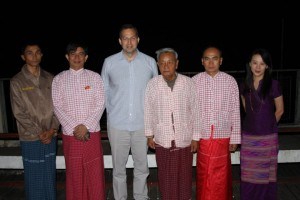The U.S. Ambassador to Burma Derek J. Mitchell met with Mon Buddhist abbots last Sunday at Aukpagu Mon Monastery in Moulmein, the capital of Mon State.

At the meeting, Ambassador Mitchell asked about the monks’ activities concerning the current peace process and inquired into Buddhist literature and the number of Mon Buddhist monks and monasteries, according to Abbot Thila Wonthaka of Hanthar Htaw monastery in Thanbyuzayat.
“Because we were involved when the New Mon State Party and Burmese government officials came to register the peace process at the union level, Ambassador Mitchell asked us about the current peace situation. We replied that we have not received any information since the registration, and have not had any contact with U Aung Min, the head of the government’s peace negotiating team.”
Two other embassy officials and nine Mon Buddhist monks attended the meeting, including Abbot Ta-ranar and Abbot Kaw-pa Lian from Kyaikma-Myaw Town and abbots from Pa-auk Wai-la-won, Aukpagu, and Hanhtar Htaw monasteries in Thanbyuzayat.
The previous day, Ambassador Mitchell met with leaders of Mon political parties to discuss their respective political views and opinions about the peace process. The group met at the Strand Hotel in Moulmein and included Nai Ngwe Thein, the chairman of the All Mon Regions Democracy Party, Dr. Min Soe Linn, the general secretary of the Mon Democracy Party, and Nai Tala Nyi, an executive committee member of the New Mon State Party.
“[The political representatives] all asked the Ambassador to urge the U.S. to seek a solution to the ongoing fighting between the Burmese government army and Kachin troops,” said Nai Tala Nye.
According to a statement released on January 10 by the U.S. Embassy in Rangoon, the Ambassador planned to discuss resolutions to the suffering he witnessed on a previous trip through the country, as well as address challenges regarding ceasefire agreements, political dialogue, and economic development.
Ambassador Mitchell was appointed as the top U.S. diplomat to Burma in June 2012 and has surveyed opportunities to provide humanitarian aid to refugees during visits to Arakan State, the site of frequent sectarian violence between Buddhist Arakanese and Muslim Rohingyas, and Kachin State in the north, where violence continues between government and Kachin troops.



